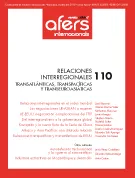Has interregionalism failed? The EU-ASEAN negotiations

This essay analyses why the European Union and the Association of Southeast Asian Nations (ASEAN) began negotiations on free interregional trade in 2007 and why, and to what extent, they had failed just two years later. The author’s study is based on document analysis and semi-structured interviews with senior officials in the EU and the ASEAN member states and takes a classical realist approach which maintains that the EU was attempting to ensure its economic and regulatory power in the region. Interregionalism seemed, initially, to be the most logical path, with the EU seeing ASEAN as a cohesive bloc. Nevertheless, the EU came up against the manifest heterogeneity of the ASEAN states. The failure of the interregional strategy is the result of a delicate balance in the EU between political and economic interests in Southeast Asia, a balance that it pursues through specific commercial activities.
Key words: EU, ASEAN, interregionalism, new regionalism, foreign policy, trade
>> The full text articles of this issue are available only in Spanish language